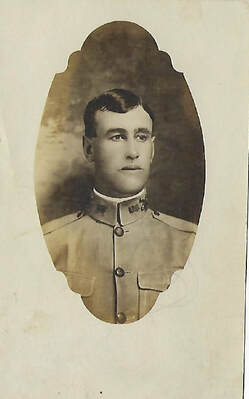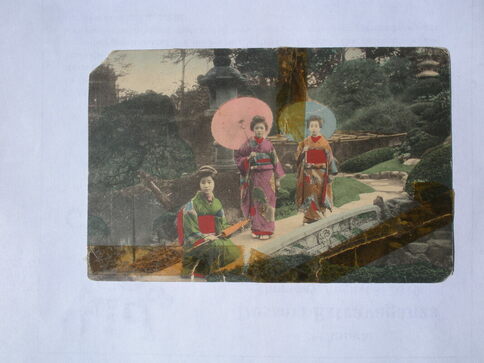|
I just returned from my first visit to Japan. It’s been 110 years since my grandfather Thomas Purl Hartle served in the Pacific with the army. The life-long devotee to Teddy Roosevelt helped build harbors in Corregidor, the Philippines, and Hawaii and visited Yokohama and Tokyo in Japan.  Purl- U. S. Army 1909-1912 Purl- U. S. Army 1909-1912 Interesting photos in the Edo-Tokyo Museum showed crowded 1910 streets that he’d walked. It’s hard to imagine that he’d had these experiences and then went home to small towns in Ohio that he never left again except for a couple of visits to his sister Anna in San Antonio, Texas. Here’s an excerpt from Purl’s travels in the Philippines from Yours in a Hurry. Chapter 13 Purl guessed right. The topographical survey in some ways wasn't a lucky assignment. Transport was difficult and uncomfortable. Ponies and caribou couldn't be used through mountains, jungle, and across ravines, so a contingent of native porters pulled large boxes containing their equipment and provisions. One night an officer found an abandoned shack with some supplies. Purl and the other soldiers sat and rested after the day's march. Purl decided to take out his pen and share some experiences with Anna. Philippines February 3, 1909 Dear Anna, I was selected to assist in documenting our survey, so thought I would describe our experiences for you to share. Our party is divided into three sections, each with one commissioned officer, eight enlisted men, and four porters. We are provided provisions for two weeks, the time needed to complete the survey of our assigned territory. We went to the province of Bulacan. The route is through many barrios. Due to the heat, we bivouacked under roof instead of on the ground when possible. We once slept in an old native house of worship in Buena Vista and woke to church bells and chants by native Tagalogs who are now Catholic. We left through the Marquina Valley—large forests of bamboo, ebony, and bush-like trees filled with tropical fruits and vegetables, and a strong cinnamon smell. I can see why Spain fought so hard to keep this land. In the dense forest of the San Madre Mountains, we saw many monkeys and parrots and stopped to trade for food. I wish you could have seen the Albinos in northern Luzon—an entire colony who inherit the trait. They are shy and shield themselves from the sun with a fan of palm leaf. We passed a village of Igorrote head hunters—a wild tribe of the North who eat dog and grasshopper pies. As we begin our last few days, cholera and smallpox are reported throughout Luzon. It is against the law to drink un-boiled water, and we follow the rule as best we can out here. Much more to tell, but Robbie says that we need to fix camp as a storm may be coming. Your brother After finishing his letter, Purl walked out to where Robbie was standing. "Sarge says it may be a typhoon," Robbie said. "He hasn't been through one before, but some of the other men have." Purl squinted upward and assessed the darkening sky. "I'll give it at least an hour before we know for sure. I best be getting a shave in. It could be a long day or two." "You are the only man I know who can't be with a bristle of hair on your face!" "It's the light complexion—looks poorly with hair." The troops did what they could to make a meal of the brown and somewhat mushy produce they found in the shack by combining it with their tins of meat. Purl had just finished eating and stretched out on his blanket on the floor when a loud wind whistled through the palms. The shack trembled as though it would fall down around him. Purl heard thunder from far away. Flashes of lightening hit the ground as the storm approached. Each flash lit the dark room, and he could see Robbie cringing on the floor nearby. "That one was close. I don't remember storms this fierce in West Virginia!" Robbie said. After another loud clap of thunder the wind caused the palms to sway more erratically. "If this is a typhoon, you can be sure it's nothing like back home." The maelstrom continued until daylight. When they awoke, empty sacks of chewing tobacco lay scattered on the shack floor. "A lot were sure scared!" Robbie said, assessing the debris. "I went through one of those pouches myself." Purl replied. "When I wasn't worried, I was bored—couldn't sleep." They pieced together a quick breakfast of bread and fruit. The lieutenant came into the shack, wet and with muddy boots. "I don't think the rain is going to stop. We may as well get going. Pack up." The rain continued until midafternoon. They stepped carefully across the desolated landscape through deep gullies worn in the soil, avoiding flooded streams. Purl, one of the tallest, often had to stoop to avoid drooping palms. Then the sun began to blaze. Starting down the trail, they passed a Filipino carrying a load of sugar cane. Robbie said, "I'm going to go ask that native about the shack we stayed in last night. I still don't understand why it was vacant with all those supplies." He motioned to the Filipino translator. "Ask that man if he knows why no one is living in the shack on the hill with all the provisions. It appears they just up and left." The translator spoke to the man, returned, and without emotion, reported to Robbie, "No one will live there. All of the family died of the cholera." Purl watched as Robbie ran to the lieutenant and with heavy breathing asked, "Do we have anything to take for the cholera? Everyone in that shack died and now we're all going to be sick!" The lieutenant replied calmly, "Don't worry, White. I think we would know by now if we were contaminated. There's no delay in the action of that germ." One of the men standing next to Purl had eaten a significant amount of fruit in the shack. He turned pale, sat on the ground, put his head in his hands, and said, "We're all going to die!" The young lieutenant shook his head and helped the man up. "Come on, soldier, let's pick up the pace and get back to camp." They returned the next day. "It's good to be back at headquarters." Robbie said. "Good food, showers, cards, and music. Who could ask for more? And no one died of the cholera!" he added with mock seriousness. Purl chuckled, thinking of the anxiety some of them showed on the trail. "No, but some were near scared to death.” He was quiet for a moment. "A visit home sure wouldn't be bad. I'd like to see my family. And until we leave Manila, construction on the Corregidor emplacements will be harder work." Robbie yawned. "Well, right now I'm going to fall into bed." "See you in the morning." Next time: The importance of ‘place’ in a novel: Little Cities of the Black Diamonds
Ann Otto writes fiction based on factual as well as oral history. Her debut novel, Yours in a Hurry, about Ohioans relocating to California in the 1910’s, is available on-line at Amazon, Barnes & Noble, Kindle, and at locations listed on her website at www.ann-otto.com. Ann’s academic background is in history, English, and behavioral science, and she has published in academic and professional journals. She enjoys speaking with groups about all things history, writing, and the events, locations, and characters from Yours in a Hurry. She is currently working on her next novel about Ohio’s Appalachia in the 1920’s and prepared for future works by blogging about a recent World War 2 European tour. She can be reached through the website, or on Facebook @Annottoauthor or www.Goodreads.com.
2 Comments
|
Archives
August 2020
Categories
All
|

 RSS Feed
RSS Feed